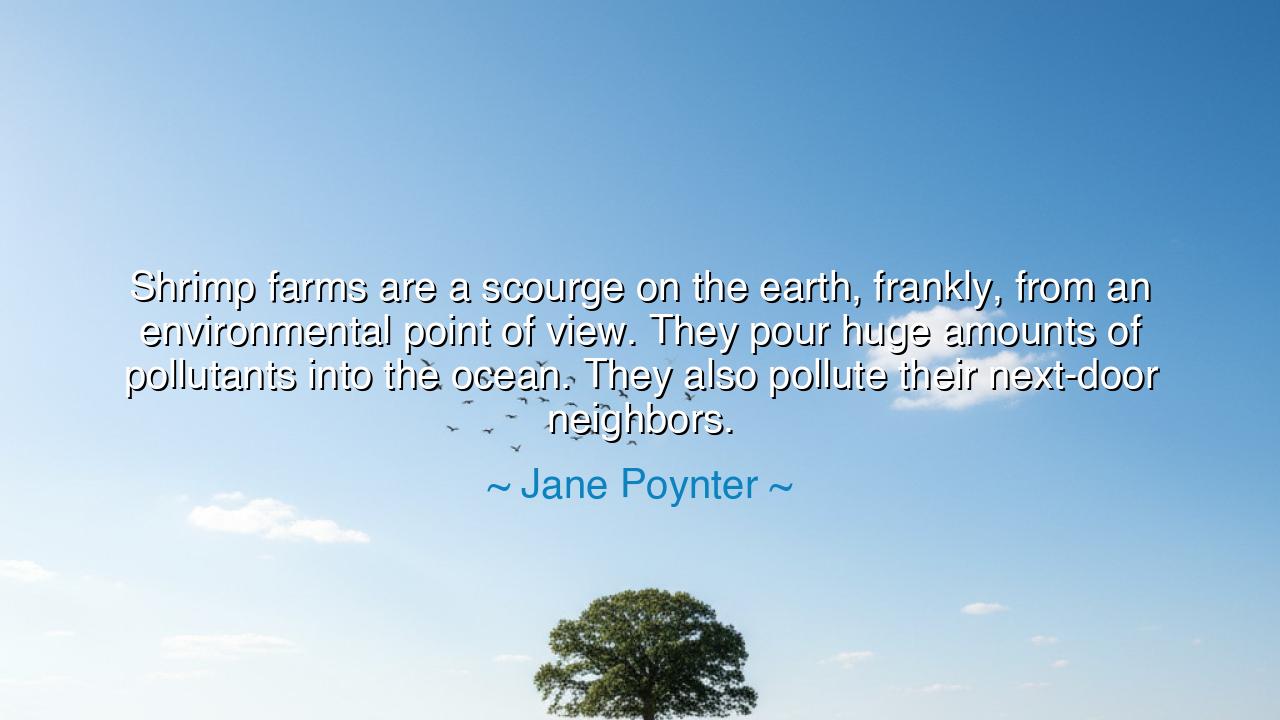
Shrimp farms are a scourge on the earth, frankly, from an
Shrimp farms are a scourge on the earth, frankly, from an environmental point of view. They pour huge amounts of pollutants into the ocean. They also pollute their next-door neighbors.






Hear the uncompromising words of Jane Poynter, who speaks with the urgency of one who has seen the fragility of our world: “Shrimp farms are a scourge on the earth, frankly, from an environmental point of view. They pour huge amounts of pollutants into the ocean. They also pollute their next-door neighbors.” These are not words of gentle warning, but of fierce indictment. For when one names a thing a “scourge,” one places it among plagues and curses, among the gravest afflictions humanity has brought upon itself.
The meaning of her warning lies first in the destructive practices of shrimp farming. To feed the appetite of markets, vast stretches of coastal mangroves—those guardians of shorelines, nurseries for countless fish—are cut down and replaced with shallow pools teeming not with life, but with chemicals, antibiotics, and waste. What was once a living forest of roots and birdsong becomes a stagnant pit, and the pollutants that seep from it poison not only the ocean, but the villages and farms nearby. Thus, profit is made by one hand, while devastation is delivered to another.
History provides its witness. In Thailand and Ecuador, where the expansion of industrial shrimp farms promised wealth, the outcome was ruin. The mangroves were stripped away, leaving the coasts vulnerable to storms and erosion. Fishermen, once sustained by the richness of natural waters, found their catches declining. Villagers reported sickness, their wells and fields fouled by salt and chemical runoff. What was sold as prosperity became a cycle of poverty and destruction. This story is the embodiment of Poynter’s words: a scourge upon both earth and neighbor.
The ancients would have understood this truth well, for they knew that to poison the waters was to betray the covenant of life itself. They revered rivers and seas as sacred, offering sacrifice before drawing their bounty, lest greed provoke divine wrath. In their myths, those who defiled the waters were punished with famine and disease. Poynter’s warning is but a modern echo of that ancient wisdom: that the ocean is not a sewer for profit, but the womb of life, and to foul it is to strike at the heart of creation.
Her words also strike at the illusion of distance. She reminds us that shrimp farms pollute their next-door neighbors—a truth that extends beyond geography. For in an interconnected world, no pollution remains local. The poisons of one coast drift on currents to another. The destruction of one ecosystem shakes the balance of the whole. The shrimp upon a distant plate carries with it the hidden story of forests lost, communities harmed, and waters poisoned. Thus, the scourge spreads silently, masked by commerce and consumption.
The lesson is clear: we must not be deceived by the comfort of ignorance. The food we eat is not born in isolation; it carries the weight of choices made upon the land and sea. To support destructive practices is to share in their burden. To seek alternatives—sustainable fisheries, plant-based foods, or carefully managed farms—is to lift some of that weight from the shoulders of the earth. True environmental consciousness is not spoken in slogans, but lived in decisions made at the market, the kitchen, the table.
Therefore, let each one act with vigilance and compassion. Learn the origins of your food. Refuse the bounty that comes at the cost of poisoned seas and broken communities. Support efforts to restore mangroves, to heal the coasts, to give back to the earth what has been taken. For though the scourge is real, so too is the power of renewal. Where mangroves are replanted, the fish return; where communities resist, new models of sustainability rise.
So let Jane Poynter’s words echo in your heart: “Shrimp farms are a scourge on the earth.” Do not take them lightly, for they are a summons to responsibility. Stand as guardians of the waters, as protectors of neighbors near and far. And remember: the ocean is not ours to exploit, but ours to defend. If we honor it, it will feed us for generations; if we betray it, it will return to us only emptiness. The choice lies in our hands, in every meal, in every act of stewardship.






AAdministratorAdministrator
Welcome, honored guests. Please leave a comment, we will respond soon